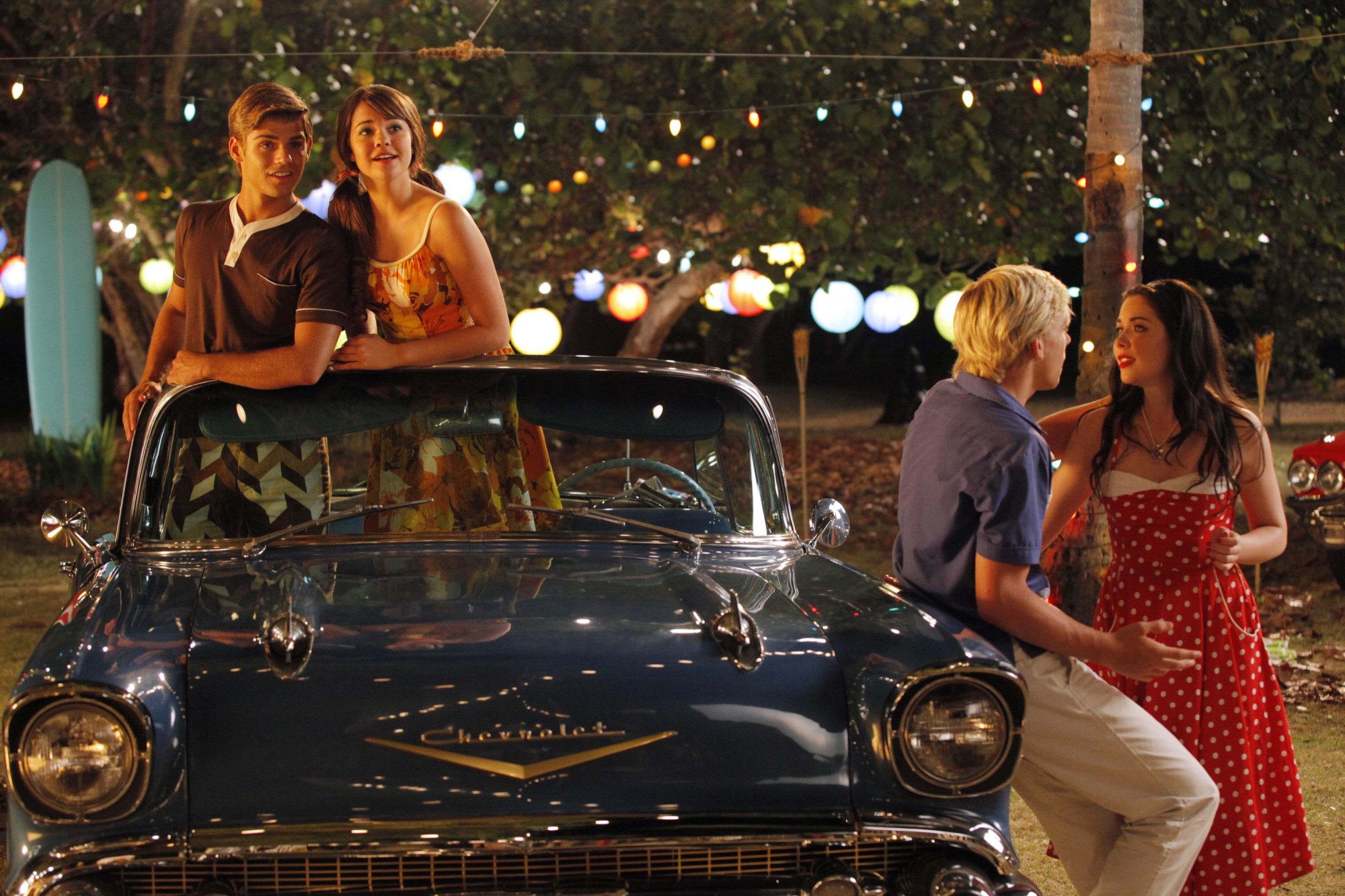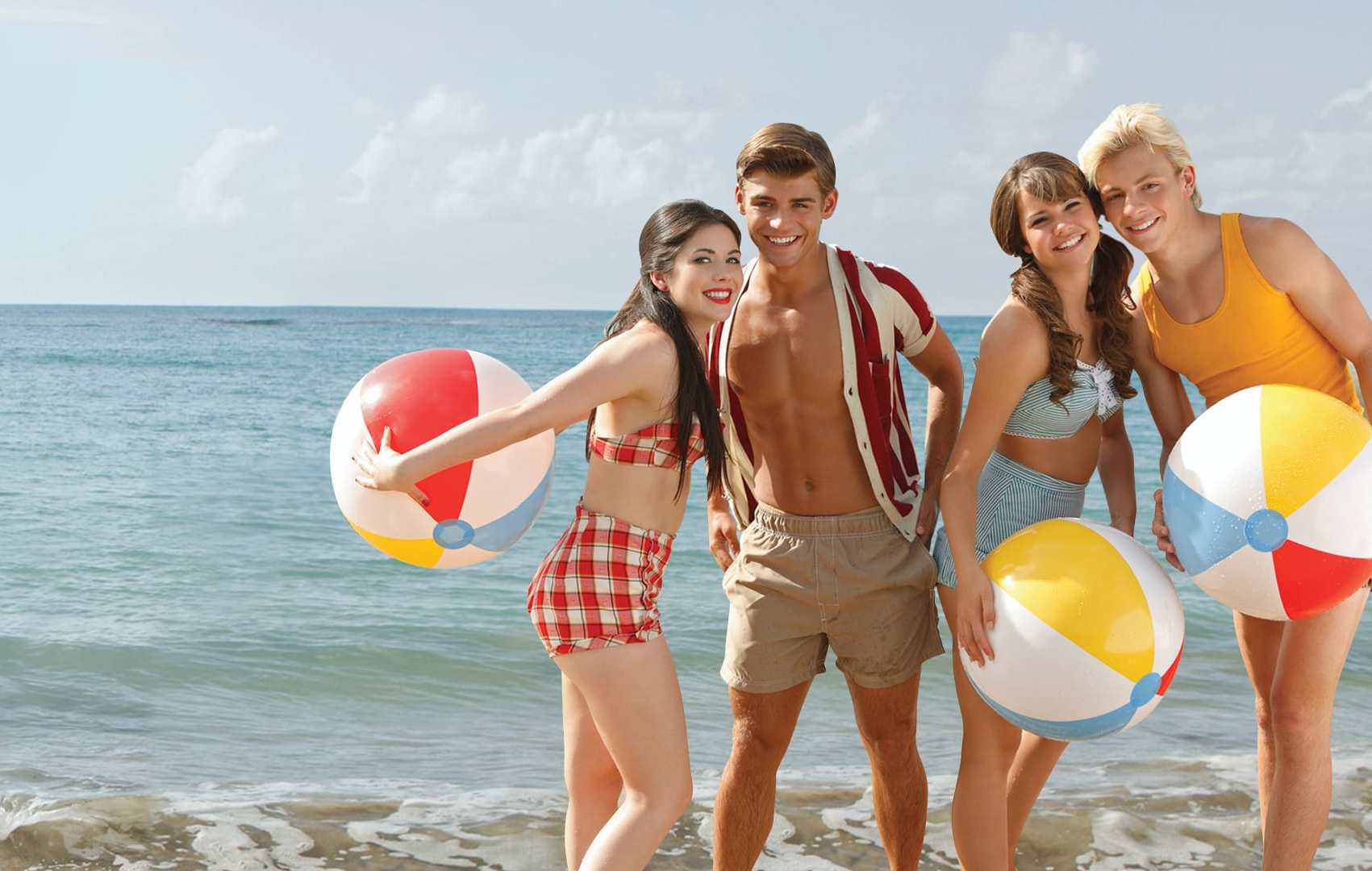When it comes to Disney Channel Original Movies (or DCOMs, to those in the know), there are three words which tend to imply the be-all-and-end-all: “High School Musical”. But while Troy, Gabriella, and the rest of the Wildcats remain top dogs in the Disney canon, there’s another DCOM that dropped just as the red-and-white dust of the franchise had begun to settle; a film that has (tragically) lived its entire life in HSM’s shadow — Teen Beach Movie. Without a doubt Disney Channel’s campest and most overtly queer flick, Teen Beach Movie is a bonkers yet often overlooked classic. Not only is it one of the TV channel’s most impressive original films, but also a cleverly-crafted Trojan horse for a coming out story set against the backdrop of a 1960s surfer hangout.
If for some godforsaken reason you haven’t seen the 2013 made-for-TV gem that is Teen Beach Movie, here is a brief summary — though, fair warning, a synopsis can hardly do justice to the off-the-wall energy of the actual film. Surfer teens Mack (Maia Mitchell) and Brady (played by a pre-Chilling Adventures of Sabrina Ross Lynch) are enjoying a summer of catching gnarly waves and getting up to slo-mo beach-related antics, when Mack suddenly finds out she’s being whisked away to the city for boarding school.
Wanting to catch one last wave, Mack goes surfing in a storm, and when Brady follows to rescue her, the duo awaken in the fictional world of Wet Side Story (nope, not a typo) — a cheesy 1960s musical about rival surfer and biker gangs — Brady’s favourite movie. But after accidentally derailing the plot of the film by inadvertently separating the romantic leads, Lela and Tanner, Mack and Brady rush to get the pair back together and the Wet Side Story narrative back on track before they’re trapped in this world forever.
Despite the unusually ambitious premise, at the core of the film — and every other DCOM spawned in this era — is a generic and uplifting message of empowerment and individuality. In Teen Beach Movie, this manifests in Mack and Brady teaching the characters of Wet Side Story that it’s okay to dress and act how they want to, rather than how they think they should. It’s a relatively tame and by-the-book lesson, but if you dig just beyond the surface, it’s incredibly easy to read between the lines and enjoy Teen Beach Movie not just as a film about being yourself, but more specifically about queerness and the struggles of coming out in an era rife with homophobia and strict, heteronormative ideas surrounding gender conformity.
“By setting the film in the past, Teen Beach Movie is able to externalise for younger viewers why conforming to expectations of gender presentation can be damaging.”
Now, don’t get me wrong — Disney Channel has certainly flirted with queer-coding characters before: High School Musical’s theatre-obsessed, hat-loving Ryan being the most well-known example. A special nod goes to his infamous outfit swap with basketball jock Chad in the epic High School Musical 2 number “I Don’t Dance” (“there is no heterosexual explanation for this,” writes one commenter). But with Teen Beach Movie, the fact of the film not being set in the present day allows for Mack and Brady to explicitly acknowledge the era’s conservative attitudes towards gender roles. By setting the film in the past, Teen Beach Movie is able to externalise for younger viewers why conforming to expectations of gender presentation can be damaging. And for older, more discerning audiences, the setting also functions as a way to explore performative heterosexuality and the struggles of being closeted.

If Ryan was the blueprint for queer-coded Disney characters, Teen Beach Movie takes the trope to a whole new level with squeaky-clean surfer boy Tanner — Wet Side Story’s romantic lead. Played by Garrett Clayton (who is out and proud and remains close friends with a number of his other queer Teen Beach Movie co-stars), Tanner has all the aesthetic trappings of early archetypal portrayals of gay men in 50s and 60s cinema. Besides the Ken doll hair and the perfect teeth, Tanner quotes Shakespeare, weaves flower crowns, and is prone to singing in falsetto. When confronted by Mack about his interests, however, he plays dumb, talking in circles and feigning disinterest in poetry because he’s under the impression that that’s not how other people think he should act.
The musical number “Like Me” is an encapsulation of this idea, bringing to light Tanner and Lela’s proclivity for downplaying their actual interests or personalities because they don’t align with what they’re told is the attractive, implicitly ‘proper’, way to look, speak, and act. The characters of Wet Side Story sing about how “boys like girls like me”; Lela and Mack spar over what they perceive is the best way to get a boy’s attention: Mack suggests “pick[ing] up the check” while Lela insists it’s to “bake him a pie.” As the number progresses, Mack and Brady, who come from an era where both queerness and challenges to gender norms are much more readily accepted, show Lela and Tanner that just because there are old-fashioned, ‘traditional’ ideas of masculinity and femininity doesn’t mean that conforming to them is the only way to live.
“Like Me” also serves as the introduction to the film’s other major queer storyline — Mack and Lela’s friendship, which is arguably the queer core at the movie’s centre. Lela is an über-feminine, flirty, and often ditsy biker girl, but she’s immediately drawn to Mack — the tomboyish surfer who not only challenges Lela’s ideas on how to dress, but also encourages her to explore interests that she was previously afraid to try.
Their relationship culminates in what can only be described as a coming out scene where, in a moment of vulnerability, Lela confides in Mack that, despite being the sister of the leader of the biker gang, she’s always wanted to try surfing. It’s a silly metaphor, sure — Lela has been ‘riding’ all her life, and now she wants to try something new — but the language used throughout the film is ultimately highly queer-coded, particularly phrases like “I’m not as much like me as people think”, and “I have a secret I’ve never told anybody.” Lela goes on to explain that she’d secretly wanted to surf all her life, but thought that it was something only boys did — but after seeing Mack surf “like a boy”, she’s finally found the courage to try for herself.
It’s about as thinly veiled as a coming out scene in a kid’s movie can get, and one that could only have come in a film that already shares a number of other traits with classic queer cinema staples: Wet Side Story’s villain takes several beats from Rocky Horror’s Dr. Frank-N-Furter, and the film even features a cameo appearance from Barry Bostwick (Rocky Horror’s Brad Majors) himself. Between the homoerotic dance battles, hammed-up performances, and Broadway-style tap numbers, the film is a significant tonal departure from most other DCOMs in that it makes virtually no attempts to appeal to its tween audience with trendy fashion or bigger franchise tie-ins (as contemporaries like Descendants do), and instead commits to going full camp.
Though most audiences may remember it as a silly, unremarkable entry in the Disney Channel canon, Teen Beach Movie’s not-so-subtle queer storyline still proves to be ahead of its time when it comes to Disney’s (often tokenistic) relationship with LGBTQ+ representation. A hidden gem of a DCOM, Teen Beach Movie is an utterly original, surprisingly funny, and refreshingly authentic movie-musical with a gaggle of catchy numbers and grade-A choreography, all rolled into a gutsy, progressive story exploring historical depictions of gender roles and the struggles of wanting to live authentically in an era that tells you you’re wrong for wanting to be yourself. What more could you ask for?

